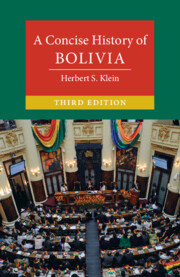Book contents
- A Concise History of Bolivia, Third Edition
- Cambridge Concise Histories
- A Concise History of Bolivia Third Edition
- Copyright page
- Contents
- Preface to the Third Edition
- Preface to the Second Edition
- Preface to the First Edition
- Chapter 1 Geography and Pre-Columbian Civilization
- Chapter 2 The Creation of a Colonial Society
- Chapter 3 Late Colonial Society: Crisis and Growth
- Chapter 4 Revolution and the Creation of a Nation-State, 1809–1841
- Chapter 5 The Crisis of the State, 1841–1880
- Chapter 6 The Ages of Silver and Tin, 1880–1932
- Chapter 7 Disintegration of the Established Order, 1932–1952
- Chapter 8 From the National Revolution to the Cold War, 1952–1982
- Chapter 9 Creating a Multiethnic Democracy, 1982–2002
- Chapter 10 The Emergence of a Mestizo and Indigenous Elite
- Political Chronology
- Tables
- Bibliography
- Index
Chapter 2 - The Creation of a Colonial Society
Published online by Cambridge University Press: 02 December 2021
- A Concise History of Bolivia, Third Edition
- Cambridge Concise Histories
- A Concise History of Bolivia Third Edition
- Copyright page
- Contents
- Preface to the Third Edition
- Preface to the Second Edition
- Preface to the First Edition
- Chapter 1 Geography and Pre-Columbian Civilization
- Chapter 2 The Creation of a Colonial Society
- Chapter 3 Late Colonial Society: Crisis and Growth
- Chapter 4 Revolution and the Creation of a Nation-State, 1809–1841
- Chapter 5 The Crisis of the State, 1841–1880
- Chapter 6 The Ages of Silver and Tin, 1880–1932
- Chapter 7 Disintegration of the Established Order, 1932–1952
- Chapter 8 From the National Revolution to the Cold War, 1952–1982
- Chapter 9 Creating a Multiethnic Democracy, 1982–2002
- Chapter 10 The Emergence of a Mestizo and Indigenous Elite
- Political Chronology
- Tables
- Bibliography
- Index
Summary
The Iberian Peninsula in the fifteenth and sixteenth centuries was the leader of European expansion on a global scale. The Portuguese initiated European world domination through the conquest of the oceanic trade routes of Africa and Asia. And Spain – and more specifically the Castillian kingdom within the Spanish state – undertook the conquest and settlement of vast territories of the Western hemisphere. America, unlike Africa and Asia, was unknown and unintegrated into the Eurasian world prior to the fifteenth century. By its American conquest, Spain provided a whole new arena for exclusive European settlement and development that in turn gave Europe a decided advantage in its race for world influence. Thus, the Castillian conquest of the lands of America, along with the Portuguese conquest of the international sea lanes, finally tipped the balance of world economic power to Europe and helped prepare the way for its ultimate industrial domination as well. The conquest of America in the late fifteenth and early sixteenth century was thus crucial in changing the relative importance of Europe in the world, and in defining a new world historical era.
- Type
- Chapter
- Information
- A Concise History of Bolivia , pp. 24 - 59Publisher: Cambridge University PressPrint publication year: 2021

